(via Dr. Andrea Baer, Rowan University)
Please join us on Tuesday, May 25, at 3:00 PM CDT, for the ACRL SLILC (Student Learning and Information Literacy Committee) Open Educational Practices Showcase (event description below). Register here. A recording be made available following the event.
Event Description
Seeking to cultivate more inclusive and equitable learning environments, many librarians are exploring open educational practices (OEP) through which students are invited to engage as co-learners, knowledge creators, and active agents in their learning process. In this online session, librarians and fellow educators from a range of institution types will share about their experiences with OEPs, lessons learned, pedagogical considerations, and ongoing questions related to these projects. The event will consist of three presentations, followed by a question-and-answer session. Please see below for descriptions of each OEP project.
“Open Textbook Writing as a Tool of Instruction in Information Literacy Courses”
Yang Wu, Open Resources Librarian, Clemson University; Anne Grant, Instruction Coordinator/History Librarian, Clemson Libraries; and Megan Palmer, Assessment Librarian, Clemson Libraries
Semester-long information literacy courses give academic librarians the opportunity to go beyond teaching basic information literacy skills and engage students to critically reflect on the politics of information production, dissemination, and consumption. However, they also challenge librarians to develop more effective strategies to motivate students and sustain their interest over a long period. This is particularly important in the online and hybrid learning environments created by COVID-19. Our presentation introduces open textbook writing, an open education practice as a creative solution to student engagement in semester-long information literacy courses. Given by librarians who have used the practice since 2019, it highlights the connections between open textbook writing and the ACRL Framework and shows participants how the practice can be applied to courses in online and face-to-face environments. The presenters reflect on differences between these teaching environments and use student surveys and assignments to demonstrate the benefits of open textbook writing.
“WikiEdu: Open Educational Practice Overload?”
Brandon Adler, Assistant Professor, Head of Library Services, & Information Literacy Librarian (University of New Orleans)
WikiEdu is an immensely powerful Open Educational learning tool for students highlighting the work they contribute on a global scale. WikiEdu teaches students to look at information with an eye toward equity, inclusion, and diversity. By contributing research and writing to a Wikipedia article, students tackle important issues with information and content gaps, such as Wikipedia’s gender and minority gaps. Likewise, learning about and identifying content gaps teaches students to recognize research and writing with an eye toward “notability” and “neutrality” which helps to identify information written with biased or subjective points of view. Wikipedia is a wonderful tool for knowledge creation and collaborative scholarship; but is it too much? This presentation explores whether students are losing the framework in the weeds of learning the WikiEdu platform. Or vice versa? Can WikiEdu succeed in meeting its goal as an equitable and inclusive learning environment if students struggle to keep up?
“OEP Collaborations and the Open Pedagogy Project Roadmap: Considerations for Planning, Implementing, Sharing, and Sustaining Open Pedagogy Projects”
Bryan McGeary, Learning Design and Open Education Engagement Librarian, Pennsylvania State University, Ohio University; Christina Riehman-Murphy, Reference and Instruction Librarian, Pennsylvania State University
In this presentation we will discuss our collaborations with faculty on two open pedagogy projects (a student-authored textbook and a student-glossed anthology) and how this work informed the creation of our Open Pedagogy Project Roadmap, which we’ve designed to guide faculty through the process of planning, implementing, sustaining, and sharing their own open pedagogy projects. We will discuss issues inherent in this work, such as values, student agency, assessment, and the role of open pedagogy in fostering diversity, equity, inclusion, and accessibility.
